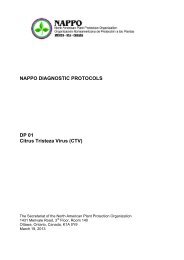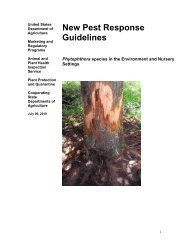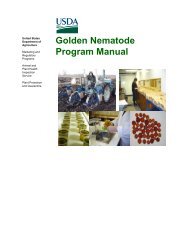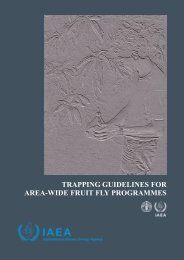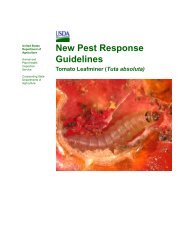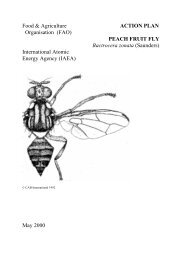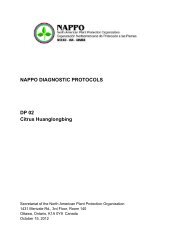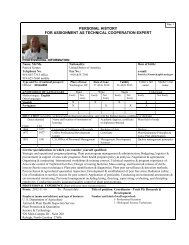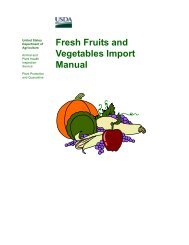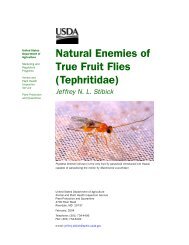PEST RISK ANALYSIS (PRA) TRAINING Group Exercises Manual
PEST RISK ANALYSIS (PRA) TRAINING Group Exercises Manual
PEST RISK ANALYSIS (PRA) TRAINING Group Exercises Manual
You also want an ePaper? Increase the reach of your titles
YUMPU automatically turns print PDFs into web optimized ePapers that Google loves.
<strong>PEST</strong> <strong>RISK</strong> <strong>ANALYSIS</strong> <strong>TRAINING</strong> - GROUP EXERCISES MANUAL GROUP EXERCISE NO. 3.7<br />
GROUP EXERCISE NO. 3.7 – STAKEHOLDER CONSULTATION<br />
Pest risk communication does not begin at the conclusion of the pest risk<br />
management stage. It is an ongoing, two-way process which occurs before, during<br />
and after the <strong>PRA</strong> is completed. Pest risk communication takes many forms,<br />
including personal communications, face-to-face informal gatherings, written<br />
correspondence, formal presentations or structured consultations. Each stage has its<br />
purpose, audience and challenges.<br />
This week, we have considered the case of a phytosanitary inspector who detects live<br />
insects in a shipment of cut flowers imported to India from an African country. We<br />
have completed a pest risk assessment, considered and evaluated possible mitigation<br />
measures and concluded that mitigation measures are necessary and available.<br />
In this exercise, each group will assume the role of a particular party in this scenario,<br />
i.e., the NPPO, the importer, or a domestic producer, and will consider the situation<br />
from that point of view. After 30 minutes preparation time, the groups will reconvene<br />
for a public meeting, at which the NPPO will present its <strong>PRA</strong>, the proposed response<br />
to the current interception and a proposed new import requirement for cut flowers<br />
from Africa. The importer and domestic producer groups will ask questions and<br />
present their points of view on this issue.<br />
<strong>Group</strong> 1: NPPO representatives<br />
You are a phytosanitary official in the NPPO of India. You have completed your <strong>PRA</strong><br />
and have identified possible mitigation measures (or sequence of measures) which<br />
will provide satisfactory protection to deal with the pest in question, and have drafted<br />
revised import regulations to prevent future introductions on this pathway. IPPC<br />
member countries are obligated to publish phytosanitary requirements and share<br />
information on pests and regulations.<br />
Prepare to inform stakeholders of new import requirements resulting from the <strong>PRA</strong><br />
that has just been completed. Be ready to answer questions which will arise.<br />
<strong>Group</strong> 2: Importers of cut flowers in India<br />
You have traditionally imported cut flowers from Africa without phytosanitary<br />
restrictions for several years. You have a customer who is buys large orders of cut<br />
flowers from Africa. You have been informed that the NPPO is conducting a <strong>PRA</strong> and<br />
will inform you of revised import requirements shortly.<br />
What are your questions for the NPPO? Do you have concerns regarding restrictive<br />
import requirements? What will be the impact on your business if import restrictions<br />
are put in place?<br />
<strong>Group</strong> 3: Domestic producers association<br />
You are members of a large domestic producers’ association with interests in a wide<br />
range of agricultural and horticultural products in India. Your members own and<br />
operate farming operations that employ many hundreds of people and produce food<br />
and plant products for sale on the domestic and export market. What are your<br />
concerns in this situation? What is your position with respect to the decision your<br />
NPPO is taking?<br />
47



